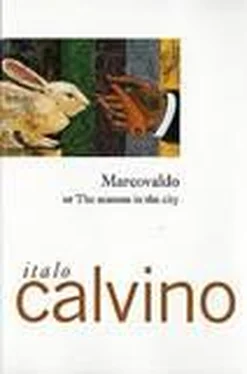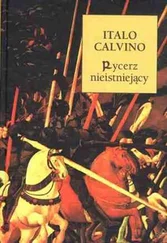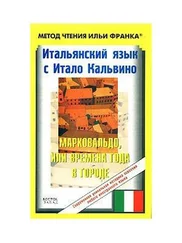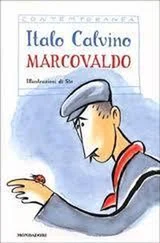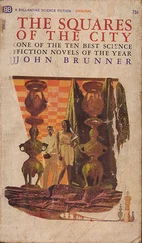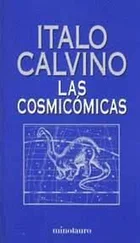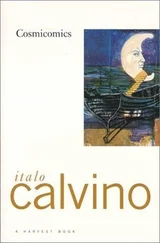"The most beautiful place we can send them," Marcovaldo declared, "is into the streets."
"We'll find good air," Domitilla concluded, "when we're evicted and have to sleep under the stars."
One Saturday afternoon, as soon as they were well again, Marcovaldo took the children and led them off on a walk in the hills. The part of the city where they lived is the farthest from the hills. To reach the slopes they made a long journey on a crowded tram and the children saw only the legs of passengers around them. Little by little the tram emptied; at the windows, finally freed, an avenue appeared, climbing up. And so they reached the end of the line and set forth.
It was early spring; the trees were just budding in a tepid sun. The children looked around, slightly disoriented. Marcovaldo led them up a little path of steps, rising among the green.
"Why is there a stairway without a house over it?" Michelino asked.
"It's not a house stairway; it's like a street."
"A street… And how can the cars manage the steps?" Around them there were garden walls, with trees inside.
"Walls without a roof… Did they bomb them?"
"They're gardens… like courtyards…" the father explained. "The house is farther back, beyond those trees."
Michelino shook his head, unconvinced. "But courtyards are inside houses, not outside."
Teresina asked: "Do the trees live in these houses?"
As they climbed up, it seemed to Marcovaldo that he was gradually shedding the moldy smell of the warehouse in which he shifted packages for eight hours a day and the damp stains on the walls of his house and the dust that settled, gilded, in the cone of light from the little window, and the fits of coughing in the darkness. His children now seemed to him less sallow and frail, already somehow part of that light and that green.
"You like it here, don't you?"
"Yes."
"Why?"
"There aren't any police. You can pull up the flowers, throw stones."
"What about breathing? Are you breathing?"
"No."
"The air's good here."
They chewed it. "What are you talking about? It doesn't have any taste at all."
They climbed almost to the top of the hill. At one turn, the city appeared, way down below, spread flat on the gray cobweb of the streets. The children rolled around on a meadow as if they had never done anything else in their life. A little breeze sprang up; it was already evening. In the city a few lights came on, in a confused sparkle. Marcovaldo felt again a rush of the feeling he had had as a young man, arriving in the city, when those streets, those lights attracted him as if he expected something unknown from them. The swallows plunged headlong through the air onto the city.
Then he was seized by the sadness of having to go back down there, and in the clotted landscape he figured out the shadow of his neighborhood: it seemed to him a leaden wasteland, stagnant, covered by the thick scales of the roofs and the shreds of smoke flapping on the stick-like chimney pots.
It had turned cool: perhaps he should call the children. But seeing them swinging peacefully on the lower limbs of a tree, he dismissed that thought. Michelino came over to him and asked: "Papà, why don't we come and live here?"
"Stupid, there aren't any houses; nobody lives up here!" Marcovaldo said, with irritation, because he had actually been daydreaming of being able to live up there.
And Michelino said: "Nobody? What about those gentlemen? Look!"
The air was turning gray and down from the meadows came a troop of men, of various ages, all dressed in heavy gray suits, buttoned up like pajamas, all with cap and cane. They came in bunches, some talking in loud voices or laughing, sticking those canes into the grass or carrying them, hung by the curved handle, over their arm.
"Who are they? Where are they going?" Michelino asked his father, but Marcovaldo was looking at them, silent.
One passed nearby; he was a heavy man of about forty. "Good evening!" he said. "Well, what news do you bring us, from down in the city?"
"Good evening," Marcovaldo said. "What do you mean by news?"
"Nothing. I was just talking," the man said, and stopped; he had a broad, white face, with only a splotch of pink, or red, like a shadow, over his cheekbones. "I always say that, to anybody from the city. I've been up here for three months, you understand."
"And you never go down?"
"Hmph, when the doctors decide to let me!" And he laughed briefly. "And this!" And he tapped his fingers on his chest, with some more brief laughter, a bit breathless. "They've already discharged me twice, as cured, but as soon as I went back to the factory, wham, all over again. And they ship me back up here. Some fun!"
"Them too?" Marcovaldo asked, nodding at the other men, who had scattered over the grass; and at the same time, his eyes sought Filippetto and Teresa and Pietruccio, whom he had lost sight of.
"All comrades on the same holiday," the man said, and winked. "We're let out on a pass, before taps… We go to bed early… Obviously, we can't go beyond the grounds…"
"What grounds?"
"This is part of the sanatorium. Didn't you know?"
Marcovaldo took the hand of Michelino, who had stood there listening, a bit scared. Evening was climbing up the slopes; there below, their neighborhood was no longer discernible, and it seemed not so much to have been swallowed by the shadows, but to have spread its own shadow everywhere. It was time to go back. "Teresa! Filippetto!" Marcovaldo called and started to look for them. "Sorry," he said to the man, "I don't see the other children anywhere."
The man stepped to a parapet. "They're down there," he said, "they're picking cherries."
In a ditch, Marcovaldo saw a cherry tree and around it were the men dressed in gray, pulling down the branches with their curved sticks, and picking the fruit. And Teresa and the two boys, all delighted, were also picking cherries and taking them from the men's hands and laughing with them.
"It's late," Marcovaldo said. "It's cold. Let's go home…"
The heavy man pointed the tip of his cane towards the rows of lights that were coming on, down below.
"In the evening," he said, "with this stick I take my walk in the city. I choose a street, a row of lamps, and I follow it, like this… I stop at the windows, I meet people, I say hello to them… When you walk in the city, think of it sometimes: my cane is following you…"
The children came back crowned with leaves, made by the inmates.
"This is a wonderful place, Papà!" Teresa said. "We'll come and play here again, won't we?"
"Papà!" Michelino blurted. "Why don't we come and live here, too, with these gentlemen?"
"It's late. Say good-bye to the gentlemen! Say thanks for the cherries. Come on! We're going!"
They headed home. They were tired. Marcovaldo didn't answer any questions. Filippetto wanted to be carried, Pietruccio wanted to ride piggy-back, Teresa made him drag her by the hand, and Michelino, the oldest, went ahead by himself, kicking stones.
SUMMER
10. A journey with the cows
The city noises that on summer nights come through the open windows into the rooms of those who are made sleepless by the heat, the true noises of the night-time city, are audible at a certain hour, when the anonymous din of motors dies away and is silent, and from the silence, discreet, distinct, graduated according to the distance, emerge the step of a noctambulant, the rustle of a night watchman's bike, a remote muddled brawl, and a snoring from the upper floors, the groan of a sick man, the continued striking of an old clock every hour. Until, at dawn, the orchestra of alarm clocks in the working-class houses tunes up, and a tram goes by on its tracks.
And so, one night, between his wife and the children all sweating in their sleep, Marcovaldo lay with his eyes closed, to listen to as much of this powdering of frail sounds as filtered from the pavement down through the low windows into his half-basement. He heard the swift, cheerful heel of a woman who was late, the patched sole of the man who stopped irregularly to collect cigarette butts, the whistle of someone who felt alone, and every now and then a broken clash of words in a dialog between friends, enough to suggest they were talking about sports or money. But in the hot night those sounds lost all relief, they dissolved as if dampened by the sultry heat that crammed the void of the streets, and yet they seemed to want to impose themselves, to assert their dominion over that uninhabited realm. In every human presence Marcovaldo recognized sadly a brother, stuck like him, even in vacation time, to that oven of cooked and dusty cement, by debts, by the burden of the family, by the meagerness of his wages.
Читать дальше
